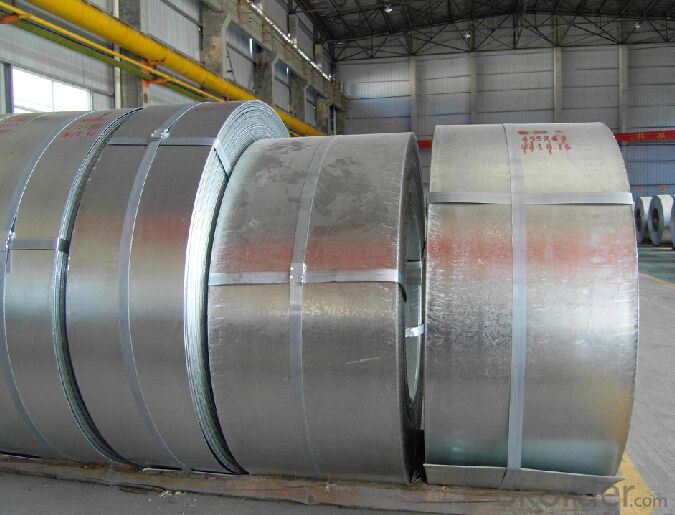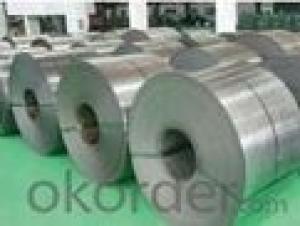Cold Rolled Coils and Sheets-Thickness 1.5mm
- Loading Port:
- China main port
- Payment Terms:
- TT OR LC
- Min Order Qty:
- 25 m.t.
- Supply Capability:
- 20000 m.t./month
OKorder Service Pledge
OKorder Financial Service
You Might Also Like
1.Structure of Cold Rolled Steel Description:
The raw material of cold rolled steel coil/sheet is high quality hot rolled product, and after pickling continuous rolling, degreasing, annealing,skin pass,slitting and cut to length line etc. Along with it many kinds of new technology and new process of global cold rolling production have been applied. Therefore the quality of the goods could be guaranteed. The product is widely used in outdoor and interior decoration, furnishing manufacturing, home appliance, automobile etc.
2.Main Features of the Cold Rolled Steel:
• Excellent process capability
• Smooth and flat surface
• Workability, durability
• Excellent heat resistance performance
• High strength
3.Cold Rolled Steel Images

4.Cold Rolled Steel Specification
Standard:AISI,ASTM,DIN,GB,JIS,JIS G3302 ASTM 653M EN10142
Grade: Q195~Q345
Thickness: 0.16mm~1.5mm,0.16-1.5mm
Width: 1250,600-1250mm
Coil weight:3-12 MT
Coil ID:508/610mm
Chemical composition:
C | Si | Mn | Cr | Ni | P | S |
0.150 | 0.476 | 11.231 | 12.50 | 0.900 | 0.039 | 0.010
|
5.FAQ of Cold Rolled Steel
We have organized several common questions for our clients,may help you sincerely:
1. How to guarantee the quality of the products?
We have established the international advanced quality management system,every link from raw material to final product we have strict quality test;We resolutely put an end to unqualified products flowing into the market. At the same time, we will provide necessary follow-up service assurance.
2. How long can we receive the product after purchase?
Production period is 30 days. And we’d prefer you can give us more time to book vessel.
3. What’s the usage of cold rolled steel coil?
Auto manufacture, Oil drum, Transformer's tank panel, Furniture etc.
- Q:I have heard of Cold Rolled steel, Castle Forged steel and Valerian steel and i was just wondering the difference between them.I know Valerian steel is by far the strongest and durable but what about the other two types? Do you know because i haven't read all the books yet.
- Castle Forged Steel
- Q:how do i quinch steel? i heard instead of water oil will actually make it harder... wat ways are best for wat steels? and how do i tell wat kind of steel i have?... i will be doin this with my poket knife..
- boy what a though question ! let me explain. when you rapidly cool a steel from high temperatures(depending on steel type) with water or oil or other means , it is called quenching. it depends on the steel type to say if it is better to quench it with oil or water but basically in water you will have a harder steel rather than oil. for some steels if you do this you will ruin it's properties ! you can't totally tell what kind of steel do you have until you get it analyzed with Quantometer analyzer with a pocket knife it is more like an estimation and it can't be trust able generally if you can scratch the steel with your knife it means it is not a hard steel and it might not be expensive. I hope that helps but for more information i need to know more !
- Q:I need new sprockets on my GSX-R1, I've heard that alumnium sprockets wear out twice as fast as steel and the difference is not noticable
- I find it hard to imagine the weight savings would ever be noticeable enough to justify using a less durable metal. You also need to figure the time spent replacing sprockets and it's possible a worn rear would cause early wear to the chain and then to the countershaft sprocket. You can also change your gear ratio easier by going down one tooth on the front instead. You just have to work the numbers. I've found it to be a simpler way to change the performance to meet that days needs. Keep it sunny side up!
- Q:I am trying to clean up a stainless steel back splash and some kitchen appliances that have brown spots that look like rust spots. I was able to remove most of them with stainless steel cleaner but does anyone know any tricks?
- if okorder /
- Q:I want to purchase steel for construction purpose, What aspects should I keep in mind while deciding that which company should I contact for this?
- It has been a few years since I was in the business but I have found that some steel from some countries can be quite different from the standards steel made in the US. For instance, one in 5 of my Indian made cast iron fittings would break when tightening it down. This never happened with US fittings. Even though I could take it back and get a refund, the increased price of US made materials was worth the savings in time and trouble. On a job in Columbia, the 3 inch angle iron came to us in 4 different sizes, all around three inches but not quite. This is not to say that all foreign metal is bad. One RD project I headed up we found a foreign bearing steel to be far superior to anything we could get in the states.
- Q:What are the different grades of steel used for manufacturing coils?
- Manufacturing coils requires the use of various grades of steel, each selected for their specific properties and suitability for different purposes. Some commonly used grades include low carbon steel, high carbon steel, stainless steel, galvanized steel, and alloy steel. Low carbon steel, also known as mild steel, is a cost-effective option with good formability. It is ideal for applications that require low strength and high ductility, such as automotive components and construction materials. High carbon steel is characterized by its exceptional strength and hardness. It is commonly employed in the production of coils that demand high tensile strength, like springs and wires. Stainless steel, an alloy with a high chromium content, offers corrosion and oxidation resistance. It is often utilized in the manufacturing of coils for the food industry, medical equipment, and automotive applications. Galvanized steel, on the other hand, is steel coated with a layer of zinc to safeguard it against corrosion. It is frequently used in the production of coils that will be exposed to harsh environmental conditions or require excellent durability, such as roofing materials and electrical appliances. Alloy steel, formed by adding elements like manganese, nickel, chromium, or molybdenum to carbon steel, exhibits improved strength, hardness, and resistance to wear and corrosion. It finds wide application in industries that necessitate high strength and toughness, such as aerospace and automotive. Choosing the appropriate grade of steel is crucial to ensure optimal performance and longevity of the coils, as it is essential to match the specific requirements of the application.
- Q:What are the common coil defects and their causes?
- Some common coil defects include edge wave, center buckle, oil canning, and coil breaks. These defects can occur due to various causes such as improper tension during the coiling process, uneven cooling, material defects, or inadequate lubrication.
- Q:the difference between the original steel and mild steel from percentage of carbon
- Carbon steel includes mild steel. Mild carbon steel(as it is referred to) contains .05 - .29% carbon. Medium carbon steel is from .30 - .59%. High carbon steel is from .60 - .99%. Ultra high carbon steel is from 1.00 - 2.00%. Steel is considered carbon steel up to 2.1%. Past that it is considered cast iron. The more carbon in the steel the harder and less ductile and maleable it is and also the more brittle it is. The less carbon in the steel more it will bend and shape without breaking. So in essence carbon adds strength but takes away from its elasticity. If you are interested in this subject an interesting source is swordmaking where hardness(carbon content) is crucial. The information behind this subject is pretty infinite.
- Q:What are the properties of high-strength steel coils?
- High-strength steel coils possess a range of unique characteristics that make them highly sought-after in diverse industrial applications. Firstly, these coils demonstrate extraordinary strength, enabling them to withstand substantial force or weight without deformation or breakage. This quality renders them suitable for demanding environments and heavy-duty purposes. Another noteworthy property of high-strength steel coils is their exceptional resistance to wear and tear. They exhibit a high level of hardness, allowing them to endure abrasion, impact, and other forms of mechanical stress. Consequently, they prove ideal for applications where durability and longevity are paramount, such as construction, automotive manufacturing, and machinery production. Furthermore, high-strength steel coils frequently exhibit remarkable corrosion resistance. They are typically coated or treated with protective materials to prevent rust or other types of deterioration caused by exposure to moisture, chemicals, or harsh environmental conditions. This corrosion resistance ensures the durability and reliability of the coils, making them well-suited for use in marine environments or outdoor structures. Additionally, high-strength steel coils offer excellent formability, meaning they can be easily shaped or bent without compromising their strength or integrity. This characteristic empowers manufacturers to create intricate or customized shapes for specific applications, enhancing the versatility and adaptability of the coils. Lastly, high-strength steel coils are renowned for their lightweight nature compared to other materials possessing similar strength properties. This low weight-to-strength ratio positions them as the preferred choice in industries that prioritize weight reduction, such as aerospace or automotive manufacturing. It facilitates improved fuel efficiency, increased payload capacity, and overall cost savings. In conclusion, high-strength steel coils possess exceptional strength, resistance to wear and tear, corrosion resistance, formability, and lightweight characteristics, rendering them invaluable and versatile materials in a wide array of industries.
- Q:How are steel coils used in the production of pipelines?
- Steel coils are used in the production of pipelines as they are rolled into flat sheets and then formed into the required shape. These coils provide the necessary strength and durability for the pipelines, ensuring they can withstand the high pressure and harsh conditions they will be exposed to.
1. Manufacturer Overview |
|
|---|---|
| Location | |
| Year Established | |
| Annual Output Value | |
| Main Markets | |
| Company Certifications | |
2. Manufacturer Certificates |
|
|---|---|
| a) Certification Name | |
| Range | |
| Reference | |
| Validity Period | |
3. Manufacturer Capability |
|
|---|---|
| a)Trade Capacity | |
| Nearest Port | |
| Export Percentage | |
| No.of Employees in Trade Department | |
| Language Spoken: | |
| b)Factory Information | |
| Factory Size: | |
| No. of Production Lines | |
| Contract Manufacturing | |
| Product Price Range | |
Send your message to us
Cold Rolled Coils and Sheets-Thickness 1.5mm
- Loading Port:
- China main port
- Payment Terms:
- TT OR LC
- Min Order Qty:
- 25 m.t.
- Supply Capability:
- 20000 m.t./month
OKorder Service Pledge
OKorder Financial Service
Similar products
New products
Hot products
Related keywords





























